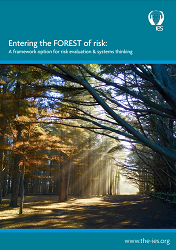In a world of complex systems, evaluating environmental risks can feel like walking into a dark forest. This report sets out a Framework as one potential option to help demystify the uncertainties posed by evaluating risks and opportunities, and to facilitate a systems thinking approach to making such evaluations.
Attempting to evaluate risks or opportunities involving complex natural systems can feel overwhelming, as navigating in one direction may lead to rapidly expanding considerations and consequences. Much like in the dark forest, we can quickly find ourselves lost if we do not have an effective guide. While systems thinking approaches may be able to support that endeavour, there have historically been insufficient tools to engage a systems thinking mind-set when evaluating risks specifically.
To help navigate through the dark forest that represents the complex considerations we need to manage in order to evaluate risks and opportunities from a systems perspective, the Framework provides a series of questions and sub-questions to facilitate that journey. As not all policy makers will start or end in the same places, the questions are designed to work in whichever order needed, with the potential to support evaluations either holistically or individually.
The questions cover (Q1) Foresight, (Q2) Opportunities & hazards, (Q3) Risk, (Q4) Exposure, (Q5) Solutions, and (Q6) Tracking (FOREST), providing an overview of many of the biggest barriers to interrogating systems linked to the potential for risks and opportunities. Much like mapping our journey through a forest, as we begin to break apart the complex dynamics of risk, we can find our way more easily.
Ideas that start in our mind as seeds can grow into innovative and system-changing ways to view an issue. To facilitate those ideas, the Framework also provides four reflections to support our approach: (R1) Systems, (R2) Engage, (R3) Evaluate, and (R4) Discover (SEED). Taking those reflections together, we can support the process of taking each answer to its full conclusion, growing like a seed until it flourishes in a more holistic understanding of the risks and opportunities involved.
Between those questions and reflections, the Framework in this report is an option to facilitate a systems thinking approach to evaluating risks and opportunities in some circumstances, with a view to transforming our view of risk from something overwhelming, obscure, and impenetrable into a rich resource that we benefit from exploring, encouraging us to look further than we otherwise would.
To that end, this Framework seeks to demystify the dark forest of risk, providing a map that will help some policy makers to conduct rich evaluations of risks and opportunities as they explore the forest of systems thinking, shifting the experience of risk evaluation from being a burden to being a benefit.


